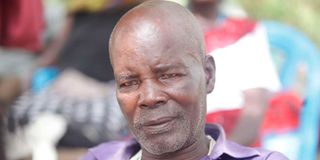Why family of Siaya mine tragedy victim will not give up yet

Martin Sikuku, father of Tom Okwach, a miner whose body is still trapped at a gold mining site at Abimbo village, Siaya County.
Their faith drives them, and they hope they will finally find their loved one, who was buried alive when a shaft collapsed at the Abimbo gold mines in Sakwa, Bondo sub-county, Siaya County.
Not even cold nights and the scorching sun can stop the search.
Miners are still working, though the tragedy that struck 100 days ago and left one dead, six rescued and one still stuck inside under rubble is still fresh in their minds.
The pleas for support by the family of Tom Okwach have fallen on deaf ears and as things stand, the hopes of finding him are waning with each passing day.
But they are still camping at the site.
According to the Luo cultural practices when the body of a loved one is not found, there are ways the family would get closure, said Mzee Daniel Okuku, from Kagan Kanyarwanda in Homa Bay County.
The first is burying a banana sucker to symbolise the departed one, and this would give the family a feeling that they have buried their relative.
"It is a common practice in the Luo community that used to happen when one died far away from home or died and the body could not be found. The banana sucker would be buried in order to appease the spirit of the dead so that they don't haunt the living," Mr Okuku said.
He added: "In the Luo community, a grave is very important. When the family sees the grave, the mind is settled that their loved one is resting."
Burying a banana plant is conducted the same way a normal body would be buried. Family members would surround the grave and the normal procedures are conducted.
The second way would be burying a stone.
"This is also a common practice among the Luos. In instances when a relative dies in a foreign land and must be buried far from home, the stone from the grave where the person is buried is taken home and then it would be buried to symbolise the presence of the grave of the departed," he explained.
This, Mr Okuku said, was the case when cholera was a menace in East Africa.
"Those who died of cholera were buried at the hospital facilities where they died. It was a policy adopted by the government. The family members of Luos who were buried at hospitals would carry a stone from the grave and bury it in a grave at home," he added.
The other way would be to carry the soil from the faraway grave and rebury it at home.
This would allow the family to have closure that their relative has been laid to rest.
The family of Mr Okwach have, however, rejected the proposal to bury a banana in place of their son. They say nothing can replace him.
Martin Sikuku, in an earlier interview with the Nation, said he had faith that he would find his child and take him home.
Fredrick Ogunde, an uncle of the victim, also said the long journey of trying to find their relative will only end when they find him.
"We shall find my nephew from the mines. God will see us through. We have nothing to make the process continue smoothly. We need an excavator to open the shafts again because during the rains they were filled with water. The excavator will help us a great deal," he said.
Artisanal miners are searching for Mr Okwach by digging with their hands, which Mr Ogunde said is tiring and time-consuming.
Eight miners were buried alive when the shaft collapsed on December 3 last year. The body of one miner was retrieved and six people were rescued alive after six days. Mr Okwach is still stuck inside.





